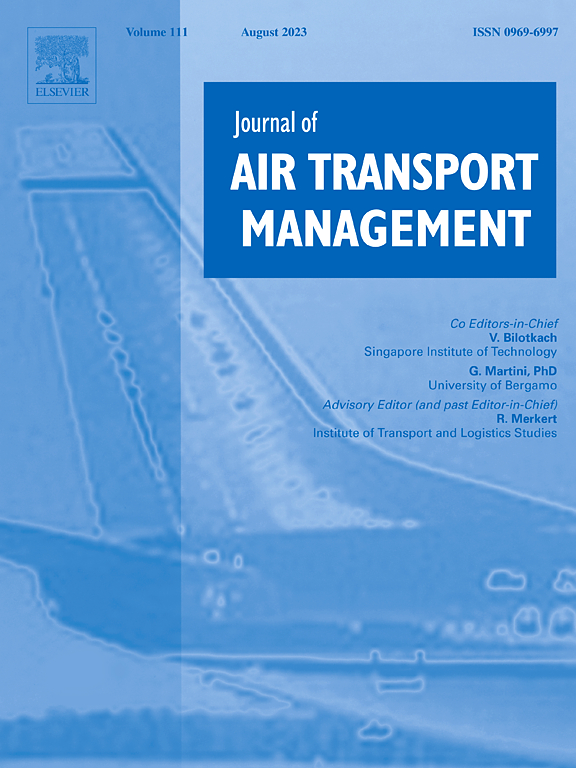A privacy-preserving federated learning approach for airline upgrade optimization
IF 3.6
2区 工程技术
Q2 TRANSPORTATION
引用次数: 0
Abstract
Purpose
A key issue of making upgrade decisions is to match the most relevant upgrade offers to the right customers at the right time. To optimize upgrade strategies and profitability, companies seek to break “data silos” between themselves and other business partners for a more holistic view of customers' consumption experiences. However, multi-source data fusion may lead to potential privacy leakage. To overcome these two challenges in data silos and privacy protection, this study introduced a privacy-preserving federated learning (FL) approach and explained the process of using FL in modeling airline passengers’ willingness to pay for upgrade offers.
Design/methodology/approach
Federated learning is a new confidential computing technique that allows companies to train a model cooperatively by exchanging model parameters instead of the actual raw data, which might include customers' privacy sensitive information. Using a case study of a Chinese airline company, this study demonstrated how FL-based upgrade models using multi-source data can be developed to improve the accuracy of predicting customers' willingness to pay for upgrades while preserving customers’ personal data privacy.
Findings
Comparing with traditional unilateral model using single-source data, the federated logistic regression and SecureBoost models demonstrate better model performance. This indicates that the proposed FL approach can enhance the accuracy of modeling airline passengers' willingness to pay for upgrade offers while preserving passengers’ data privacy. The findings also show that the FL-based models generally took longer running time than the traditional unilateral model due to the design of FL approach in ensuring data privacy.
Originality
This study contributes to the literature of upgrade optimization by introducing the new FL approach for developing machining learning models to predict customers’ reaction to upgrade offers. Although we focus on the airline industry in our case study, the proposed FL approach can be applied to other industries with a similar issue of upgrade optimization such as hotels or cruise lines, and car rental.
优化航空公司升舱的隐私保护联合学习方法
目的 升级决策的一个关键问题是在正确的时间向正确的客户提供最相关的升级服务。为了优化升级策略和盈利能力,企业寻求打破自身与其他业务合作伙伴之间的 "数据孤岛",以更全面地了解客户的消费体验。然而,多源数据融合可能会导致潜在的隐私泄露。为了克服数据孤岛和隐私保护这两大挑战,本研究引入了一种保护隐私的联合学习(FL)方法,并解释了使用联合学习对航空公司乘客的升级优惠支付意愿进行建模的过程。设计/方法/途径联合学习是一种新的保密计算技术,它允许公司通过交换模型参数而不是实际原始数据(可能包括客户的隐私敏感信息)来合作训练模型。本研究以中国某航空公司为案例,展示了如何利用多源数据开发基于联合学习的升舱模型,以提高预测客户升舱付费意愿的准确性,同时保护客户的个人数据隐私。这表明,所提出的 FL 方法可以在保护乘客数据隐私的同时,提高航空公司乘客为升舱优惠付费意愿建模的准确性。研究结果还表明,由于 FL 方法在确保数据隐私方面的设计,基于 FL 的模型通常比传统的单边模型需要更长的运行时间。 本研究通过引入新的 FL 方法来开发加工学习模型,以预测客户对升舱优惠的反应,为升舱优化方面的文献做出了贡献。虽然我们的案例研究侧重于航空业,但所提出的 FL 方法也可应用于其他具有类似升级优化问题的行业,如酒店、邮轮公司和汽车租赁业。
本文章由计算机程序翻译,如有差异,请以英文原文为准。
求助全文
约1分钟内获得全文
求助全文
来源期刊

Journal of Air Transport Management
TRANSPORTATION-
CiteScore
12.40
自引率
11.70%
发文量
97
期刊介绍:
The Journal of Air Transport Management (JATM) sets out to address, through high quality research articles and authoritative commentary, the major economic, management and policy issues facing the air transport industry today. It offers practitioners and academics an international and dynamic forum for analysis and discussion of these issues, linking research and practice and stimulating interaction between the two. The refereed papers in the journal cover all the major sectors of the industry (airlines, airports, air traffic management) as well as related areas such as tourism management and logistics. Papers are blind reviewed, normally by two referees, chosen for their specialist knowledge. The journal provides independent, original and rigorous analysis in the areas of: • Policy, regulation and law • Strategy • Operations • Marketing • Economics and finance • Sustainability
 求助内容:
求助内容: 应助结果提醒方式:
应助结果提醒方式:


